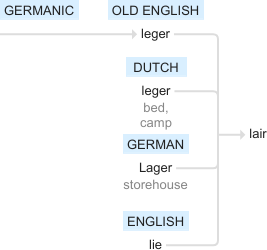Lair
Old English leger ‘resting place, bed’, of Germanic origin; related to Dutch leger ‘bed, camp’ and German Lager ‘storehouse’, also to lie1. Compare with laager, lager.
wiktionary
From Middle English leir, leire, lair, lare, from Old English leġer(“couch, bed”), from Proto-Germanic *legrą, from Proto-Indo-European *legʰ-.
From Old Norse leir(“clay, mud”). Compare Icelandic leir(“clay”).
Backformation from lairy.
etymonline
lair (n.)
Old English leger "act or place of lying down; bed, couch; illness; the grave," from Proto-Germanic *legraz (source also of Old Norse legr "the grave," also "nuptials" (both "a lying down"); Old Frisian leger "situation," Old Saxon legar "bed," Middle Dutch legher "act or place of lying down," Dutch leger "bed, camp," Old High German legar "bed, a lying down," German Lager "bed, lair, camp, storehouse," Gothic ligrs "place of lying"), from PIE root *legh- "to lie down, lay." Meaning "animal's den" is from early 15c. Essentially the same word as layer (n.), but more ancient and differentiated in sense.
